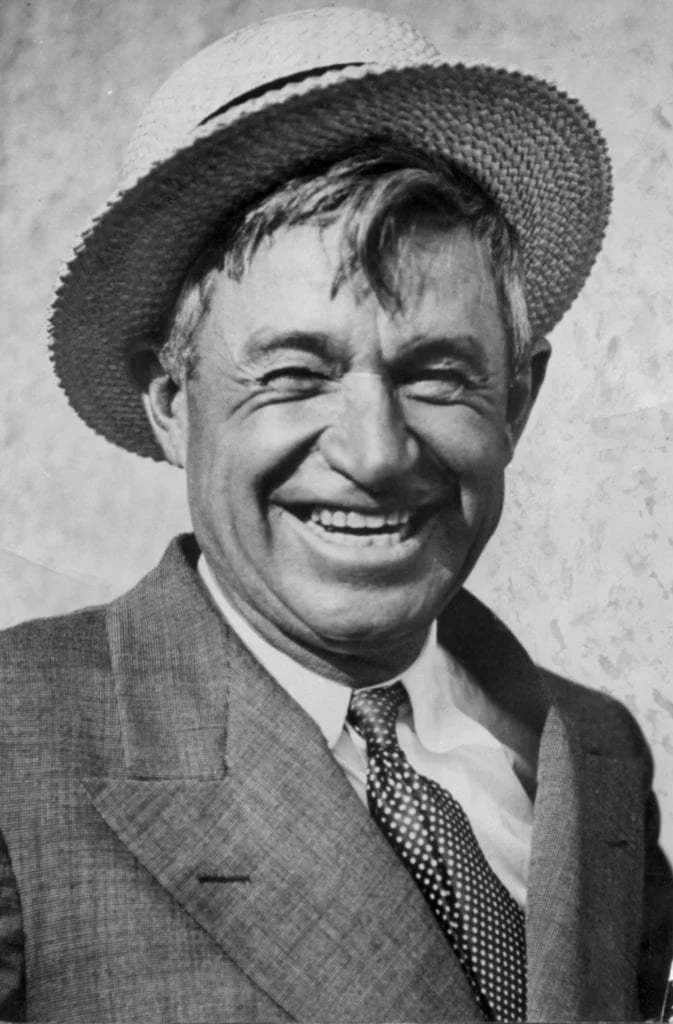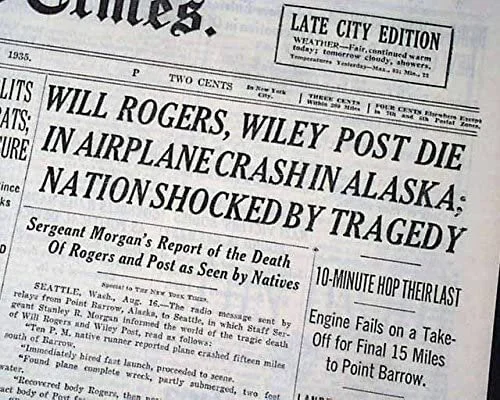GOOD WILL ROGERS
MADISON SQUARE GARDEN, APRIL 1905 — The rodeo had come to Manhattan! Bronco bustin’, ropin’ and ridin’. Cowboys in boots and Stetsons. The New York crowd was enthralled until a cry rang out. A steer had broken loose!
Suddenly a stranger in the audience stood, lariat in hand. Spinning the loop over his head, he threw it thirty feet, landing it cleanly. With a tight pull, the man dragged the steer to the ground. Who in the world?
Turned out he was a little-known vaudevillian doing rope tricks for a few bucks a night. It also turned out he was part Cherokee, part Oklahoman, with twinkling eyes and an “aw shucks” grin. All of America would soon know his name — Will Rogers.
Throughout the Roaring Twenties, Will Rogers was America’s funny bone. Remembered now for saying “I never met a man I didn’t like,” the gregarious cowboy honed a homespun style which took him beyond vaudeville to movies, radio, newspapers, books, and Broadway. To wit:
— Never miss a good chance to shut up.
— There are three kinds of men. The one that learns by reading. The few who learn by observation. The rest of them have to pee on the electric fence for themselves.
— The schools ain’t what they used to be and never was.
— I now worrying works because none of the stuff I worried about ever happened..
His grandparents had fled Cherokee country in Georgia a few years before “Indian Removal” forced their nation down The Trail of Tears. Born in Oklahoma territory, Will’s father, Clem, was a force of nature — fighting in the Civil War, working as judge, politician, rancher, and banker. Will, the youngest of eight, was expected to follow his father into respectability. But the boy just loved cowboys.
In 1903, Will and a friend took off for Argentina to work as gauchos on the Pampas. The friend soon came home but Will moved on — to South Africa, to Australia — working on ranches and mastering the cowboy art of roping. Watch:
Home after circling the globe, Rogers did rope tricks at the St. Louis World’s Fair, then joined the vaudeville circuit. But after he roped a runaway steer in Madison Square Garden, he was hired for the Ziegfeld Follies. Then came silent movies, his first starring role leading to a long-term contract.
Having charmed audiences on stage and screen, he began a newspaper column. By the mid-20s, “Will Rogers Says” appeared in papers across America. When radio went live, he stood at the mike and began, “Well, what shall I talk about? I ain't got anything funny to say. All I know is what I read in the papers." Then, chewing gum and scratching his head, he joked about the headlines, mostly politics.
— This country has come to feel the same way when Congress is in session as when a baby gets hold of a hammer.
— A fool and his money are soon elected.
— All I can say about the Senate is that it opens with a prayer and closes with an investigation.
His humor blended the timeless American suspicion of government with gentle jibes at the common man. “Everybody is ignorant,” he said, “only on different subjects.” And Americans simply loved him. In 1928, he waged a mock campaign for president, on the Anti-Bunk Party. He denounced bunk, including “the biggest one of all — to try and compliment the knowledge of the voter.” His only promise was that if elected he would resign. And on Election Day, he declared victory and resigned.
When talking movies arrived, Will Rogers became Hollywood’s biggest draw, starring opposite everyone from Boris Karloff to Mickey Rooney. In 21 films, he played ranchers, farmers, merchants — but he was really playing himself. On into the Depression, he met presidents, millionaires, and kings but continued to speak for the common man.
Outraged at corporate greed amidst hunger, he said, “we are the only nation in the history of the world that went to the poorhouse in an automobile.” Millions listened, nodded, felt understood.
“The great secret of show business,” he said, was “knowing when to get off.” Sadly, his show ended too soon. In 1935, he turned his fascination with flight — he had toured America with Lindbergh — into a trip to Alaska. Taking off from Fairbanks, his plane was forced to land on a lake. When it took off again, the engine failed. . . Reading the news, America wept.
Today his name graces airports, highways, state parks, and more. A statue of Will Rogers stands in the U.S. Capitol. He agreed to have it put there so long as it faced the House “so I can keep an eye on Congress.” But he is best remembered for his simple tribute to humanity.
“When I die, my epitaph, or whatever you call those signs on gravestones is going to read: ‘I joked about every prominent man of my time, but I never met a man I didn’t like.’ I am so proud of that, I can hardly wait to die so it can be carved.“














